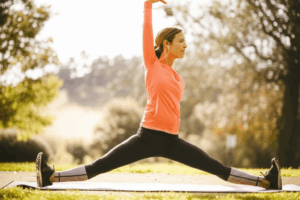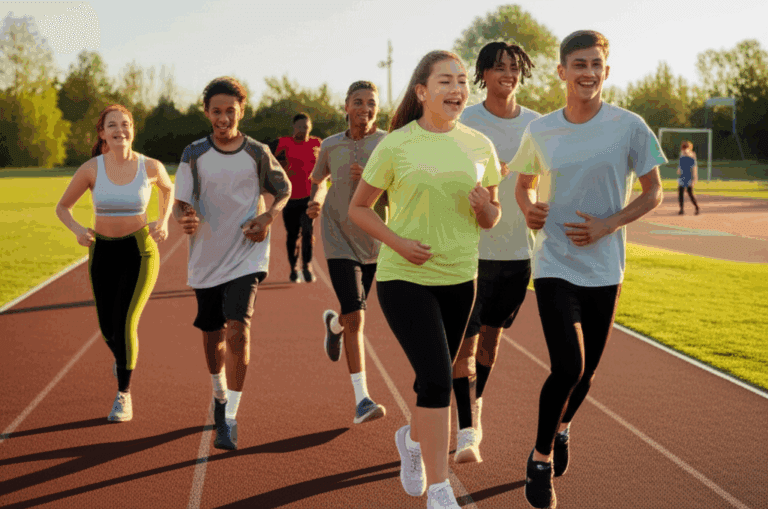Teenage years are a whirlwind of changes, challenges, and self-discovery. It’s also a time when mental health can be particularly vulnerable. But there’s good news! A growing body of research, including recent surveys and studies, highlights the powerful connection between exercise and improved mental well-being for teens. So, ditch the screens for a bit and discover how getting active can level up your mental game.
The Teen Mental Health Crisis: Why It Matters
The statistics paint a concerning picture. Studies show a rise in mental health conditions among adolescents, with a significant percentage reporting feelings of sadness and hopelessness. Poor mental health can lead to lower grades, strained relationships, and a negative outlook on life, with behaviors often carrying into adulthood. Mental health problems can also co-occur with other risky behaviors, like substance misuse.
Exercise: A Powerful Antidote
The link between exercise and mental health is strong and well-documented. Exercise can be as effective as medication in improving teen mental health and happiness levels. Physical activity helps regulate emotions and improve mood by raising the level of natural chemicals in the brain. Studies show that sports participation and skill development are linked to lower depression levels and decreased risks of suicidal thoughts, often through improved self-esteem.
Key Mental Benefits of Exercise for Teens:
- Reduces Stress and Anxiety: Exercise helps lower levels of the stress hormone cortisol while boosting endorphins, the body’s natural “happy chemicals.”
- Improves Mood and Emotional Regulation: Physical activity positively impacts serotonin levels, a chemical that helps regulate mental health, and stimulates norepinephrine, which improves mood.
- Boosts Self-Esteem and Confidence: Achieving fitness goals and mastering new skills can significantly improve self-worth.
- Combats Depression: Studies show that regular physical activity can reduce symptoms of depression.
- Enhances Cognitive Function: Exercise improves memory and retention, helping teens perform better in school.
- Promotes Better Sleep: Regular physical activity can improve sleep quality, which is crucial for mental well-being.
- Provides a Healthy Coping Mechanism: Exercise can help teens avoid or recover from substance use disorder because it stimulates similar parts of the brain’s reward system.
- Encourages Social Connection: Team sports improve interpersonal resources such as empathy, confidence, and responsibility.
- Reduces Risk of Mental Health Disorders: Research suggests that regular vigorous exercise can decrease the likelihood of developing an anxiety disorder.
- Promotes Long-Term Mental Well-being: Those who exercise regularly during their teenage years are more likely to maintain higher activity levels and better mental well-being as adults.
New Findings: Evidence from Recent Surveys
Recent surveys and studies continue to reinforce the positive impact of exercise on teen mental health:
- Planet Fitness Survey (2025): A nationwide survey revealed that 90% of teens report that exercise makes them feel happy, and 93% agree that regular exercise is beneficial when handling challenges.
- University of South Australia Study (2025): This study found that teenagers who exercise more frequently with their families are more likely to report better mental health, including higher life satisfaction and lower stress, anxiety, and depression.
- JAMA Pediatrics Study: This study used hard data from nearly 2 million participants to link physical fitness and mental health, suggesting that adolescents who improve their cardiovascular fitness and muscle power also enhance their mental health and reduce their risk of depression.
Types of Exercise That Can Benefit Teen Mental Health
The great thing about exercise is that it doesn’t have to be a chore. There are tons of fun and engaging ways for teens to get active:
- Team Sports: Basketball, soccer, volleyball, and other team sports provide physical activity and opportunities for social interaction and teamwork. Studies suggest that team sports may be more supportive for athletes’ mental health than individual sports.
- Individual Sports: Running, swimming, cycling, dancing, martial arts, and yoga are great options for those who prefer solo activities.
- Aerobic Exercise: Activities like running, swimming, and dancing have been shown to have a moderate effect on depression.
- Resistance Training: Combining aerobic exercise with resistance training can have strong effects on symptoms of depression.
- Outdoor Activities: Hiking, biking, kayaking, and simply spending time in nature can boost mood and reduce stress.
- Family Activities: Bike rides, backyard games, and other activities that involve the whole family can promote physical activity and strengthen family bonds.
Finding the Right Balance: How Much Exercise is Enough?
While exercise is beneficial, it’s essential to find the right balance. The U.S. Centers for Disease Control and Prevention recommends that children and adolescents between ages 6 and 17 get a minimum of 60 minutes of moderate to vigorous physical activity daily.
However, recent research suggests that there may be an upper limit to the mental health benefits of exercise. A study published in Psychiatry Research found that moderate amounts of activity, but not excessive exercise, were linked to fewer internalizing and thought problems. The findings indicated that about 90 minutes of moderate activity or 120 minutes of vigorous activity per day was linked to the lowest mental health burden. Exercising vigorously for more than two hours per day was not associated with additional improvements and in some cases was linked to worse mental health outcomes.
Tips for Encouraging Teens to Exercise
It can be challenging to motivate teens to get active, especially during the summer months when school is out. Here are some tips for parents and caregivers:
- Lead by Example: Get active yourself! When teens see their parents exercising, they’re more likely to follow suit.
- Make it a Family Affair: Plan family activities that involve physical activity, such as bike rides, hikes, or games in the park.
- Find Activities They Enjoy: Encourage teens to explore different types of exercise until they find something they genuinely like.
- Set Realistic Goals: Help teens set achievable goals and celebrate their progress along the way.
- Limit Screen Time: Encourage teens to spend less time in front of screens and more time being active.
- Make it Social: Encourage teens to exercise with friends or join a sports team or club.
- Offer Support and Encouragement: Let teens know that you’re there to support them and celebrate their efforts, regardless of their fitness level.
- Replace Screen Time with Physical Activities: Suggest fun and engaging physical activities that they can enjoy, like dancing or even just walking together around the neighborhood.
- Track Progress: Use a fitness journal, sticker chart, or an app to keep track of their goals and achievements. Visual reminders of progress can be very motivating.
- Focus on Self-Confidence: Help adolescents improve their self-confidence, as believing in oneself is linked to more physical activity.
The Bottom Line: Exercise for a Healthier Mind
The evidence is clear: exercise is a powerful tool for improving teen mental health. By encouraging teens to get active, parents, educators, and communities can help them build resilience, manage stress, and thrive both physically and mentally. So, let’s get moving and empower the next generation to prioritize their mental well-being through the joy of exercise.







